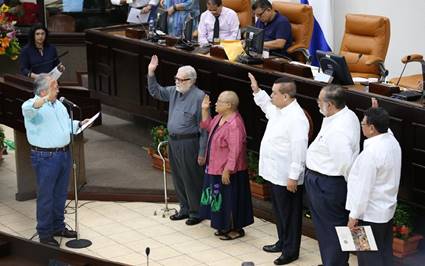7 de mayo 2018

“NicaraguAmor” Cultural Caravan for Nicaraguans in the USA

PUBLICIDAD 1M
PUBLICIDAD 4D
PUBLICIDAD 5D
Students said Saturday that the government appointed body has no legitimacy.

The Nicaraguan National Assembly set up a ‘Truth, Justice and Peace Commission’, to which it gave the mandate to “know, analyze and clarify the truth of the latest events in the country,” referring to the massacre perpetrated by the Police and groups related to the Sandinista Front, against unarmed students protesting against reforms to the social security system.
Nineteen hours before the start of the parliamentary swearing in ceremony, four student organizations that emerged during the April rebellion rejected the initiative announced by Assembly president Gustavo Porras a week earlier.
The Coalition, integrated by the Nicaraguan University Alliance (AUN), the Student Movement April 19 (ME19), and the University Movement April 19 (MU19), believes that the National Assembly, chaired by Gustavo Porras, “has no legitimacy to conform any investigation process that seeks to clarify the crimes against humanity committed in the last 18 days.”
For its part, the University Coordinator for Democracy and Justice (CUDJ), said that “the investigation by the Public Ministry and the misnamed ‘truth commission’, chaired by Gustavo Porras, has no validity. The murderers cannot investigate themselves. These actions demonstrate the Government’s unwillingness to create a climate that allows achieving the justice that the country demands.”
Both organizations insisted that the Ortega administration should invite the Inter-American Commission on Human Rights to come to the country to carry out the independent investigation that the nation demands.
Previously, the Nicaraguan private sector, conformed by Cosep, AmCham, Asobanp and Funides, together with all their chambers, advisers and independent businessmen, expressed the need “to open an independent and credible investigation, with the participation of recognized human rights organizations,” although without specifying which ones.
The commission formed by the National Assembly on the morning of Sunday, May 6, is made up by Father Francisco Uriel Molina Olue; the lawyer Jaime Francisco Lopez Lowery, vice-rector of the National Autonomous University of Nicaragua (Unan-Managua); Atlantic Coast intellectual Mirna Cunningham; the lawyer Adolfo Jarquin Ortel, assistant governmental attorney for Human Rights, and the academic and intellectual Cairo Melvin Amador.
Porras said that, although the board of directors of the National Assembly had the mandate to form and swear in the aforementioned Commission, the deputies would be allowed to vote for or against, (but not to propose to anyone). True to its doctrine of single thought, 74 deputies voted in favor, none against, and only one abstained.
After being sworn in and reading the minutes, the five commission members received a period of three months to present results. Porras told them that, although the Assembly had appointed them, they would function outside the orbit of that State power, which only fulfilled the function of originating and integrating it.
“They are free to make their corresponding inquiries,” he said.
Translated by Habana Times
Archivado como:
PUBLICIDAD 3M
Periodista nicaragüense, exiliado en Costa Rica. Durante más de veinte años se ha desempeñado en CONFIDENCIAL como periodista de Economía. Antes trabajó en el semanario La Crónica, el diario La Prensa y El Nuevo Diario. Además, ha publicado en el Diario de Hoy, de El Salvador. Ha ganado en dos ocasiones el Premio a la Excelencia en Periodismo Pedro Joaquín Chamorro Cardenal, en Nicaragua.
PUBLICIDAD 3D